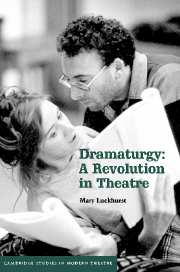Book contents
- Frontmatter
- Contents
- List of illustrations
- Acknowledgements
- List of abbreviations
- 1 Introduction
- 2 Gotthold Lessing and the Hamburg Dramaturgy
- 3 Dramaturgy in nineteenth-century England
- 4 William Archer and Harley Granville Barker: constructions of the literary manager
- 5 Bertolt Brecht: the theory and practice of the dramaturg
- 6 Kenneth Tynan and the National Theatre
- 7 Dramaturgy and literary management in England today
- 8 Conclusion
- Select bibliography
- Index
6 - Kenneth Tynan and the National Theatre
Published online by Cambridge University Press: 22 September 2009
- Frontmatter
- Contents
- List of illustrations
- Acknowledgements
- List of abbreviations
- 1 Introduction
- 2 Gotthold Lessing and the Hamburg Dramaturgy
- 3 Dramaturgy in nineteenth-century England
- 4 William Archer and Harley Granville Barker: constructions of the literary manager
- 5 Bertolt Brecht: the theory and practice of the dramaturg
- 6 Kenneth Tynan and the National Theatre
- 7 Dramaturgy and literary management in England today
- 8 Conclusion
- Select bibliography
- Index
Summary
In October 1963 Kenneth Tynan (1927–80) became the first official Literary Manager in Britain. Widely perceived as the most brilliant theatre critic since Shaw, he relinquished the post he had held at the Observer for nine years and entered the newly created National Theatre (NT), where he remained for a decade. His tenure has interesting parallels with Lessing's, and he certainly saw his share of crisis and controversy, but unlike Lessing, Tynan has not been internationally celebrated for his rôle: he is remembered for his reviewing and his work at the NT is framed as marginal to his career as a critic. His appointment challenged traditional British management structures assigning artistic and managerial responsibility to actor-managers, and in post Tynan provided a model of literary management that continues to be appropriated and refashioned by theatre companies throughout the United Kingdom. Yet Tynan's term as Literary Manager suffers from curious academic erasures, and the official history of the NT even appears to disclaim Tynan's power and influence while in post.
One significant reason for the silences surrounding Tynan's time as Literary Manager was the invisibility of his work, much of which took place in a small office, and unlike the contributions of writers, actors, designers and directors was unfamiliar and uncomprehended. In 1998 Tynan's manuscripts became available at the British Library: they reveal his functions, working relationships and prolonged internal battle for appropriate recognition of his rôle.
- Type
- Chapter
- Information
- DramaturgyA Revolution in Theatre, pp. 152 - 199Publisher: Cambridge University PressPrint publication year: 2006



